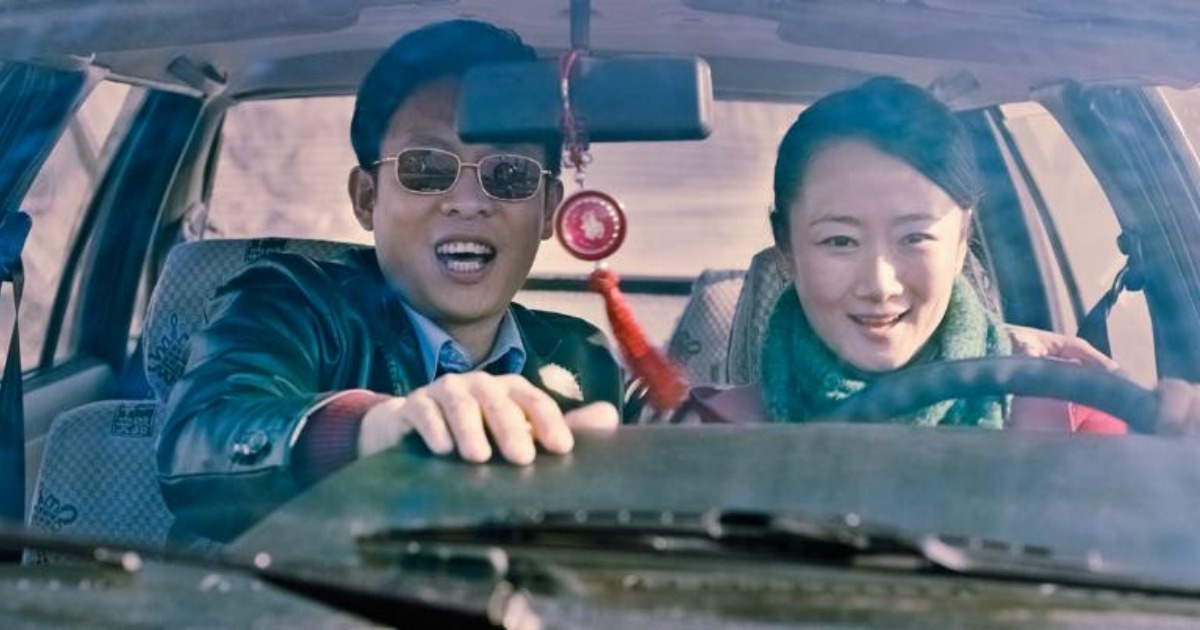A decidedly different piece of cinema from his last, breathlessly visceral A Touch Of Sin, legendary Chinese filmmaker Jia Zhang-ke’s latest motion picture, Mountains May Depart is not only one of the auteur’s most accessible works, but despite its sputtering final act, one of his most entrancing.
Despite also having a narrative broken up into segments, A Touch Of Sin’s brutal exploration of violence born out of oppression and vignette-style structure is nowhere to be found here, with Jia Zhang-ke opting for a story that feels far more personal, and far more narratively engaging. Mountains May Depart is a story told over 26 years, with our story touching down in the past (1999), relative present (2014) and the near future (2025). In the first segment, we’re introduced to a schoolteacher named Tao, who is caught in what appears to be a love triangle between she, her closest friend Liangzi and a man named Jinsheng, who himself has just come into owning a mine. As the story progresses, the narrative jumps from nuanced romance into a distinct tale of class dynamics, with Tao ultimately falling into the arms of Jinsheng, with the two ultimately giving birth to a son named Dollar.
With the flash forward into 2014, which itself is introduced by the film’s title credit sequence, almost an hour into the film proper, we see the characters we were previously introduced to as their lives have descended into madness. Liangzi, who left his job to begin work in a coal mine, is suffering from terminal cancer, and at the behest of his wife, meets back up with Tao, who herself is divorced and battling to earn back custody of her son. With her son under the custody of Jinsheng in Shanghai, she reunites with Liangzi momentarily, only to be told that her father has died. Learning of her ex-husband’s intent to move he and their son to Australia, this second “act” is ostensibly the film’s most emotionally texture piece, a briskly paced extension upon the sociological politics directly at the core of this film.
Flashing into the near future, we see Dollar, now 18 years of age, unable to connect with his familial roots. Living in Australia with his father, he is purely unable to find any connective tissue for he and his father to hang onto, with Dollar having very little interest in exploring his heritage. Toss in an affair with his teacher and you have a story that feels a touch too familiar and is told in a manner that is far too on the nose and hamfisted. As we see Jinsheng literalize many of the film’s core themes and manifest them physically in a character that goes from bone-headed capitalist to full blown weapon fiend, the final act sputters to a near-hault, with the story becoming dramatically inert and oddly superficial.
Jia Zhang-ke, however, lives up to his placement as one of Chinese cinema’s foremost filmmakers, taking a left turn here from A Touch Of Sin, turning in a picture that is both decidedly personal and potently political. Yu Lik Wai’s photography is startling in its composition, and with the shifting aspect ratios through the film, the style here is rich and layered. Crisply framed and quietly composed, the direction here never draws attention to itself, with Zhang-ke’s style allowing for enough room for each respective performance to truly breath.
The star of this film is without a doubt Zhao Tao, Jia Zhang-ke’s wife and oft-collaborator. Her performance as Tao is powerful, introspective and above all else nuanced, never once judging her character for any decision made, finding the same sense of joyful vitality that opens the film in the breathtaking final sequence. The opening hour or so is the crown jewel of the film, playing as the most powerful distillation of the film’s central themes, and it is in her performance, and her playing off of costars Liang Jin Dong and Zhang Yi that allows for this world to feel fully lived in and ultimately carry some relatively weighty concepts. The second act carries with it a higher emotional arch, but it’s ultimately the final segment that, once again, drowns much of the film’s thematic nuance in its own hamfisted preaching. Clocking in at roughly two hours, pacing is touch and go here, but thankfully the central performances are engaging and each shot finds Jia Zhang-ke at the very top of his game.
Decidedly more accessible than the brutal A Touch Of Sin, this meditation on class dynamics and modern Chinese social politics slowly unravels into a laughably on the nose final act, but with beautiful photography and some genuinely superb performances, this is a solid entry in Jia Zhang-ke’s filmography, one of the most important canons in modern world cinema.




